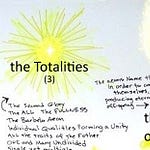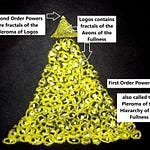Welcome back to the Gnostic Reformation on Substack. Last week I began sharing with you what is essentially a book report on the book called That All Shall Be Saved, Heaven, Hell, and Universal Salvation by David Bentley Hart, and he's the translator of the New Testament that I've been using. So, last week we got up to page 21 out of this book, and now I'm all the way up to page 85, so we'll see what happened in this latest round of reading.
Now, David Bentley Hart's style of writing may not be for everyone. It's very academic, very high-minded and educated and erudite—difficult to follow if you're not accustomed to reading scholastic writing. But I believe his heart's in the right place, and I agree with pretty much everything he says. I will do my best to reinterpret what he is saying in simpler words, in case you're interested in the content, but not in its delivery method.
So, picking it up on page 21, Hart says,
And what could be more absurd than the claim that God's ways so exceed comprehension, that we dare not presume even to distinguish benevolence from malevolence in the divine, inasmuch as either can result in the same endless excruciating despair? Here the docile believer is simply commanded to nod in acquiescence, quietly and submissively, to feel moved at a strange and stirring obscurity, and to accept that, if only he or she could sound the depths of this mystery, its essence would somehow be revealed as infinite beauty and love. A rational person capable of that assent, however, of believing all of this to be a paradox concealing a deeper, wholly coherent truth, rather than a gross contradiction, has probably suffered such chronic intellectual and moral malformation that he or she is no longer able to recognize certain very plain truths, such as the truth that he or she has been taught to approve of divine deeds that, were they reduced to a human scale of action, would immediately be recognizable as expressions of unalloyed spite.
And he's talking about the idea that most everyone and everything is going to hell and will suffer eternal torment. That is an interpretation or misinterpretation of the word brought about by incorrect translation of the original Coptic Greek. Most of our Bible translations come off of old Latin Vulgate translations, and then they've been modernized. But that's how errors are brought forward. And what Hart has done in his New Testament translation is go back to the original, very oldest transcripts, still in Greek, before they were translated to Latin. And he did what he called a pitilessly accurate translation, where Hart was not trying to make the words that are being translated fit into a predetermined doctrine, like everyone going to hell, or like the Trinity, or eternal damnation.
These things we've been taught to believe are in the Scripture, but when you actually go back to the original Scriptures prior to the Latin translations, they are not in the Scripture. And so this book that I'm doing the book report on here, That All Shall Be Saved, this is about universal salvation, and doing away with the idea. And he says in this section I just read you, that it is a malevolent idea, unalloyed spite, unalloyed meaning pure spite on the part of God, that's going to send everyone to hell that doesn't get it.
And that we have been commanded by the Church over the last 2,000 years to just nod our heads and say, oh, well, it's God's will, or oh, well, how can I presume to distinguish benevolence from malevolence, good intention from bad intention on the part of God, because God is so great and good. We're supposed to be docile believers, to acquiesce, that is, to go along with, to quietly and submissively accept that we don't get it, that we don't understand the depths of the mystery, and someday we will, and that God is good, and God is just, and therefore everyone's going to hell, except for those few preordained elect from before time began. So this book is entirely against that proposition. So moving on, what I did was I read the book through, and I've highlighted the parts that seem worth sharing or very interesting.
Now we're jumping to page 35, where he says that certain people,
of my acquaintance who are committed to what is often called an intellectualist model of human liberty, as I am myself, [he says], but who also insist that it is possible for a soul freely to reject God's love with such perfect perpiscuity of understanding and intention as to merit eternal suffering.
And we can tell from the context that perpiscuity means you get it. So he's saying, how is it even possible for a soul to freely reject the love of God and consign oneself into eternal torment? It just doesn't work. It's not possible. He says,
this is an altogether dizzying contradiction. In simplest terms, that is to say, they, [that is, the intellectualists], want to assert that all true freedom is an orientation of the rational will toward an end that the mind takes in some sense to be the good, and so takes also as the one end that can fulfill the mind's nature and supply its desires. This means that the better the rational will knows the good, and that's a capital G, good, for what it is, the more that is that the will is freed from those forces that distort reason and lead the soul toward improper ends. The more it will long for and seek after the true good in itself, and conversely, the more rationally it seeks the good, the freer it is.
He says that in terms of the great Maximus the Confessor, who lived from 580 to 660,
the natural will within us, which is the rational ground of our whole power of volition, must tend only toward God as its true end, for God is goodness as such, whereas our gnomic or deliberative will can stray from him, but only to the degree that it has been blinded to the truth of who he is and what we are, and as a result has come to seek a false end as the true end. In short, sin requires some degree of ignorance, and ignorance is by definition a diverting of the mind and will to an end they would not naturally pursue.
So, in other words, we all want what's best for ourself, even in the most selfish sense, even in the most egoic sense. The ego wants what is best for this person that it is part of, that that is the rational end of the ego's striving, what is best, and that there is a thing called good in the absolute sense, and if we realize that, then we would strive toward the good, by definition. Carrying on, page 37,
I'm not saying that we do not in some very significant sense make our own exceedingly substantial voluntary contributions to our estrangement from the good in this life.
And, see, he's just saying we all screw up. Even if we are seeking the good, we often fall backwards into the bad, okay?
Up to a certain point, [he says], it is undeniable, but past that point it is manifest falsehood. There is no such thing as perfect freedom in this life, or perfect understanding, and it is sheer nonsense to suggest that we possess limitless or unqualified liberty. Therefore, we are incapable of contracting a limitless or unqualified guilt. There are always extenuating circumstances.
Well, in a sense, that's true of all of us and all of our circumstances. We are a product of our environment, to some extent. But don't forget that in the Gnostic view, we also contain the pure goodness of God, the capital S Self, that reflects the Fullness of God. So we do know what goodness is, even if we are surrounded by badness.
Quoting Hart again, page 40,
Here though, I have to note that it is a thoroughly modern and wholly illogical notion that the power of absolutely unpremised liberty, obeying no rationale except its own spontaneous volition toward whatever end it might pose for itself, is either a real logical possibility or, in any meaningful sense, a proper definition of freedom.
See? He's saying it's thoroughly modern and wholly illogical to think that we have complete freedom of will, and that we can choose to follow any unethical or immoral end that we wish to, because what's it matter? One choice being pretty much the same as another, you see. He goes on to say, in page 40,
A choice made without rationale is a contradiction in terms. At the same time, any movement of the will prompted by an entirely perverse rationale would be, by definition, wholly irrational. Insane, that is to say. And therefore, no more truly free than a psychotic episode. The more one is in one's right mind, the more that is that one is conscious of God as the goodness that fulfills all beings. And the more one recognizes that one's own nature can have its true completion and joy nowhere but in Him, and the more one is unfettered by distorting misperceptions, deranged passions, and the encumbrances of past mistakes, the more inevitable is one's surrender to God, liberated from all ignorance, emancipated from all the adverse conditions of this life, the rational soul could freely will only its own union with God, and thereby its own supreme beatitude.
We are, as it were, doomed to happiness, so long as our natures follow their healthiest impulses unhindered. And we cannot not will the satisfaction of our beings in our true final end, a transcendent good lying behind and beyond all the proximate ends we might be moved to pursue. This is no constraint upon the freedom of the will, coherently conceived. It is simply the consequence of possessing a nature produced by and for the transcendent good, a nature whose proper end has been fashioned in harmony with a supernatural purpose. God has made us for Himself, as Augustine would say, and our hearts are restless till they rest in Him. A rational nature seeks a rational end, truth, which is God Himself.
The irresistibility of God for any soul that has been truly set free is no more a constraint placed upon its liberty than is the irresistible attraction of a flowing spring to fresh water in a desert place to a man who is dying of thirst. To choose not to drink in that circumstance would not be an act of freedom on his part, but only a manifestation of the delusions that enslave him and force him to inflict violence upon himself, contrary to his nature.
Do you follow the reasoning there? That boils down to simply saying it is logical. Even Mr. Spock would find it logical for a human to pursue the good in its own best interests, and that it is illogical, illogical all the way to insanity, to refuse the good, to refuse what is best for you. It's a manifestation of insanity, to refuse the love of God. How's that for laying it out? I really appreciate logic, you know, because this is a logical universe.
If the laws of physics and chemistry didn't hold true to logic, and that includes math, you see, 2 plus 2 equals 4, etc., all the way through all the difficult math, the quantum physics, and the string theory, and so forth, this is a logical universe based upon the Aeon known as Logos, logic. And so, therefore, to reject logic, it's not smart, it's not clever, it's not freedom. And, by the way, this is about the level of pushback I see in, for example, YouTube comments that reject the gospel. They're pretty much on the order of, oh, yeah, I can die of thirst if I want to, so F off. Okay, well, good luck with that, right? Carrying on, page 43.
None of this should need saying, to be honest. We should all already know that whenever the term justice and eternal punishment are set side by side as if they were logically compatible, the boundaries of the rational have been violated. If we were not so stupefied by the hoary and venerable myth that eternal damnation is an essential element of the original Christian message, and then he says in parentheses, which, not to spoil later plot developments here, it is not, we would not even waste our time on so preposterous a conjunction. From the perspective of Christian belief, the very notion of a punishment that is not intended ultimately to be remedial is morally dubious, and he says in parentheses, and I submit anyone who doubts this has never understood Christian teaching at all.
But even if one believes that Christianity makes room for the condign imposition, [and condign means proper or fitting], imposition of purely retributive punishments, it remains the case that a retribution consisting in unending suffering, imposed as recompense for the actions of a finite intellect and will, must be by any sound definition disproportionate, unjust, and at the last, nothing more than an expression of sheer pointless cruelty.
And of course, I do find that attitude on the part of Christians I talk to and try to explain the idea of universal salvation being Christ's true mission, that all shall be redeemed, every knee shall bow. They'd much rather send people to hell, and when you see their faces as they're saying it, it's not, oh, you know, I'm so sorry that it's this way and my heart breaks, but I'm afraid they're all going to hell. It's not like that at all. It's like, damn straight, they deserve to go to hell. Now, you take that kind of anger and cruelty when you consider that they are advocating unending, excruciating pain and punishment, and then you try to say that that is God's will, that goodness incorporates unending punishment.
And Hart's saying, indeed, especially unending punishment that isn't for remediation, isn't to make them a better person, but simply to make them hurt. And who are you punishing? Finite beings with limited time and intelligence and ability to reason with things that happened in their past. Maybe they were brought up by someone very cruel who taught them cruelty, and so they carry on cruelty. And then that the God of all love and the God of all justice would send them to hell for eternal torment. And up until quite recently, even babies who were unbaptized would be sent to hell for eternal torment. And then someone came up with the idea of a baby purgatory where unbaptized babies never get to go to heaven, but they're not going to be eternally punished either. They're just going to go to a baby land where they're held apart from the rest of the redeemed. Well, really? That's hardly any better. I mean, it's somewhat better, but why shouldn't these pure babies who pretty much incorporate the Fullness of the Self and love of God, why wouldn't God want them back? You see, it doesn't make any sense.
And if you're a Christian listening to me today who has had niggling doubts about certain things, and one of them being this idea of grandma being in hell and in the midst of eternal torture now because she wouldn't listen to your preaching, you can relax about it. Because we are the sower of seeds, but we are not the harvester. It is Christ who harvests the souls, who brings them all home.
Back to Hart here again. On page 47, he says,
Once more, not a single one of these attempted justifications for the idea of an eternal hell actually improves the picture of God with which the infernalist orthodoxy presents us.
And he uses the word infernalist for like the infernal torments of hell. So an infernalist is someone who believes folks are going to hell for eternity. So he says,
Once more, not a single one of these attempted justifications for the idea of an eternal hell actually improves the picture of God with which the infernalist orthodoxy presents us. And it is this that should be the chief concern of any believer.
All of these arguments still oblige one to believe that a benevolent and omnipotent God would willfully create rational beings destined for an endless torment that they could never, in any rational calculus of personal responsibility, earn for themselves. And to believe also that this somehow is essential to the good news Christianity brought into the world.
Isn't it true? When you're in church and you hear the preacher preaching a very nice, very good message about relationships or about moral virtue, and then there is a plea and a threat at the end that if you are sitting in the congregation and you have not accepted Christ as your personal Savior, you may go out and die this afternoon and go to hell. It's not right. It's contradictory. It is not the pure will of God. Page 47 goes on to say,
In the end, there is only one logical terminus toward which all these lines of reasoning can lead: When all the possible paths of evasion have tapered away among the weeds, one has to stop, turn around, retrace one’s steps back to the beginning of the journey, and finally admit that, if there really is an eternal hell for finite spirits, then it has to be the case that God condemns the damned to endless misery not on account of any sane proportion between what they are capable of meriting and how he chooses to requite them for their sins, but solely as a demonstration of his power to do as he wishes.
Now, by the way, when I read the Old Testament, I see that that is often the attitude that Jehovah has towards his subjects. He commands things because he can, and he wants obedience because he wants obedience. Remember, the Demiurge controls through strong strings. He does not approve of willpower. Willpower is messy. Willpower means not obeying the will of God, and he wants to be the sayer of our souls. But the God Above All Gods, the Gnostic God, outranks the Old Testament God. The God Above All Gods is the Father who begat the Son.
And so when Jesus says, I and my Father are one, he's not talking about the Old Testament God. He's talking about the God Above All Gods, the originator of consciousness, of love, of life, of free will. And we are all fractals of that Father. Through the Son, through the Fullness of God, we are fractals of all of those powers of the Father--stepped down, because we're smaller fractals. So we all have to return to the Father in the end.
When we loose these mortal coils and we're no longer bound to the material that deludes us, then we can finally return to the Father again. So onward and upward is not a trap. Onward and upward is freedom. Don't let anyone tell you otherwise. So back to this idea of the Old Testament God enjoying his omnipotent sovereignty. On page 48, Hart is talking about Calvin and predestination. And he says in book three of Calvin's Institutes,
he even asserts that God predestined the human fall from grace, precisely because the whole of everything, creation, fall, redemption, judgment, the eternal bliss of heaven, the endless torments of hell, and whatever else, exists solely for the sake of a perfect display of the full range of God's omnipotent sovereignty, which for some reason absolutely must be displayed.
He goes on to say he doesn't know how to respond to that, because,
I know it to be based on a notoriously confused reading of Scripture, one whose history goes all the way back to the late Augustine, a towering genius whose inability to read Greek and consequent reliance on defective Latin translations turned out to be the single most tragically consequential case of linguistic incompetence in Christian history. In equal part, however, it is because I regard the picture of God thus produced to be a metaphysical absurdity, a God who is at once supposedly the source of all things, and yet also the one whose nature is necessarily thoroughly polluted by arbitrariness.
And no matter how orthodox Calvinists might protest, there is no other way to understand the story of election and dereliction that Calvin tells, which would mean that in some sense he is a finite being, that is God, in whom possibility exceeds actuality, and the irrational exceeds the rational. A far greater concern than either of these theological defects, either the deeply misguided scriptural exegesis or the inept metaphysics of the divine, it is the moral horror in such language.
So that's as far as we're going to go today. In next week's continuance of this train of thought, Hart will talk about the difference between the God Above All Gods, essentially, even though Hart's not calling himself a Gnostic. When he speaks of God, or goodness with capital G, he is speaking of the God Above All Gods. And when he contrasts it with the God of Calvin and Augustine in the Old Testament, that is the Demiurgic God.
I've noticed that many modern people seem to think of God as a yin-yang type of completion, that is, where evil balances good, where darkness is necessary to balance light, where the purpose of humanity, or what happens here in humanity, is that we are instantiating strife and struggle and evil for the teaching of God, for the completion of God. That is not right. That's wrong theology, folks. Our God is all goodness, and there is no evil that emanates from God. Well, where did evil come from then? It's merely the absence of good. So evil is the absence of goodness.
The archons are the shadows of the Aeons. And when the light fully comes and fills all of space, the shadows will disappear, and the light comes along with the love. And so that's our job, to realize that universal and ethereal love, and to so let our light shine and our lives shine with love, that the Demiurge will be eventually won over. And as for the shadows, every time we bring light into the world, we're diminishing the power of the Demiurge. We're shining light onto a shadow and evaporating it.
Next week, we'll pick this up for part three of That All Shall Be Saved by David Bentley Hart.
Let me know what you think of this. Send me some comments.
Onward and upward. God bless us all.
Please buy my latest book--A Simple Explanation of the Gnostic Gospel. In this book you will find the original Christian theology as taught by Jesus before the Catholic Church and the Emperor of Rome got their hands on it. A Simple Explanation of the Gnostic Gospel is for seekers and scholars alike. The language is as simple and accessible as I could make it, even though the subject matter is profoundly deep.
The book is available in all formats, including paperback, hardcover, and kindle. The audio book narrated by Miguel Conner of Aeon Byte Gnostic Radio, has been uploaded to ACX Audible and is awaiting their approval and release, so keep an eye out.


















Share this post